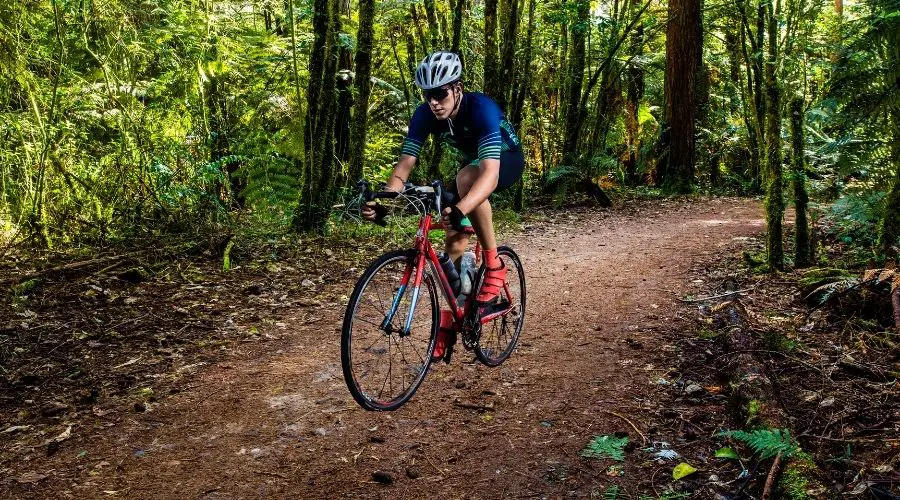Unmodified road bikes can handle compacted gravel and mostly even dirt trails. However, road bike tires aren’t suited to lightly packed substrates because they are smooth and lack the thickly textured style of off-road bicycles’ wider tires.
A slender tire like those on road bikes is meant chiefly for prepared and maintained paths like roads. Can road bikes go off-road?
Road bikes can go off-road, but you need to proceed with caution over compacted ground like a maintain trail. The skinny tires of a road bike aren’t made to handle rough terrain, potholes, or other obstacles, as well as a mountain bike can. The smooth, narrow rubber tire on this wheel style doesn’t grip well.
Recommended Gear
To see all of my up-to-date recommendations for bikes and cycling gear, check out this resource that I made for you!
Table of Contents
Can You Take A Road Bike Off-Road
You can take a road bike off-road. In fact, they do incredibly well on packed-down trails with a smoother, more rigid surface.
If you avoid major obstacles and take things slow enough to react on time, you can have a great time riding away from the road.
Below I will give you some tips for smarter, safer off-roading.
- Aim for the most compacted ground you can find and try to avoid any loose patches or potholes.
- Use your brakes right. You’ll need to master feathering. As Active.com puts it, “Practice feathering, a technique of lightly and rapidly alternating pressure and release of the brakes; this prevents brakes from locking while controlling your speed.”
- Add some air to your tires. You don’t want to overinflate them too severely, but more internal pressure can help stave off small punctures.
- Swap your tubes for a thicker option. A heavier, denser tube will handle dirt and rocks better.
- Watch your weight distribution. Keep your posture correct and center your weight.
- If you plan to go offroad all the time, trade your road bike in for an MTB or cyclocross instead.
If you’re looking for some excellent tips on how to handle your road bike if you go off-road, then I recommend the video below.
Global Cycling Network offers some great advice on adapting to different terrain on a road bike, especially when unavoidable.
They offer clever ways to stay safe and great ideas for adjusting both yourself and the bicycle for off-roading.
Can I Ride My Road Bike On Gravel
You can ride your road bike on some gravel. There are a couple of types of gravel, and it’s more than a mere size variation.
Some gravel is loosely packed and easy to slide around on, while some is dense like it gets where cars roll over it regularly.
Loose gravel is tricky and dangerous for a road bike. The thin, almost smooth textured wheel style of a road bike is not set up to roll over pieces of gravel.
Not only are the walls and tube more delicate and more prone to puncture damage, but there’s no texture to surround and pass over the pieces, which means you can slide over it, causing your wheels to go out of control in unexpected directions. It’s not hard to see why this is a problem.
Alternately, a dense, well-used gravel path can be a safe place for an unmodified road bike.
Especially when there are extra packed down areas where car wheels have compressed the gravel into a flat roadway, you can ride along these sections.
However, I still recommend paying close attention to your bike in these areas in case you hit a slippery patch.
Can Road Bikes Go On Dirt Trails
A road bike can go on dirt trails, but there are several notable downsides.
While some bikes like MTBs are quite literally made for that type of nature riding, you will find that non-dirt and trail bikes have a more challenging time handling the terrain.
Below I’ve listed the disadvantages of taking a road bike on dirt trails.
- Traction is a problem when you have narrow, smooth-textured tires with little tread depth.
- Tire and tube damage is more likely, and your thin tubes won’t take as much punishment as a beefier MTB or BMX.
- Your bike isn’t made for this environment, so you can’t ride it optimally. That means a loss of power between your legs and the wheels. Expect to fatigue faster.
- If there’s snow, sand, or even grass on your dirt trail, then you’ll find a road bike ill-prepared for those situations.
- Road bikes are fast, but they tend to lag behind purpose build bicycles on a dirt trail. If you’re trying to keep pace with friends on suitable off-road bicycles, it’s going to be a challenge.
Can You Ride A Road Bike On Grass
You cannot ride a road bike on grass. Although you can probably force your road bike over a small patch of grass, traveling any significant distance on grass will slow you down to a crawl.
Moreover, tall grasses can catch in your bike chain and potentially cause it to cease up.
Worse still, the grass is excellent camouflage. A lovely field can conceal everything from wildlife to sharp stones and unexpectedly large sticks.
Plus, it’s hard to gauge where the ground is, making it easy to hit an unseen dip or bump and send yourself flying.
Does Off-Road Cycling Damage A Road Bike
Off-road cycling can damage a bike. Having a light frame is fantastic for drafting on the road and getting up to high speeds.
Unfortunately, that same lightweight frame will take damage faster and cannot handle the same forces and strain.
Taking a tumble is more likely when operating a bicycle outside its manufacturer’s recommended safe applications.
As Apex Bikes points out, “When it comes to navigating through any sort of terrain on a bike, the performance is mainly determined by the tires being used. For rough off-road trails, wider, knobby tires at low pressures are used. Meanwhile, on smooth pavement, you would use a thinner, smoother tire at high pressures. While you won’t be able to tackle loose dirt or mud, lighter trails such as hardpack, gravel or cobblestone should not be much of a problem.”
Helpful Tips To Know About If Road Bikes Can Go Off-Road
Off-road is a blanket term that covers many different types of terrain, and it matters a great deal what terrain you plan to tackle.
Road bikes can handle dense, mostly stable off-road conditions like cobblestone and packed clay, but loose gravel, dirt, grass, and mud are different.
Here are more helpful tips to know about if road bikes can go off-road.
- Riding off-road is generally done in a standing position which can be uncomfortable to road bike riders due to their lower handlebar rise. If you need or want to ride off-road on a road bike, I suggest keeping it to a minimum.
- Feathering your brakes when you ride a road bike, especially when you’re off-road, does more than keep the brakes from locking up. The friction of your smooth tire over the rough ground can quickly and easily cause excess heat. Too much could make it burst, but even if it’s not sudden, repeated overheating will compromise your tire and tube integrity. It could lead to a crash and injuries.
- If you need a bicycle that can handle roads as well as a road bike that can also take on nature, then you’re looking for a different kind of bicycle. I recommend checking out a cyclocross if you need the best of both worlds. You can keep the on-road functionality of a road bike and gain the off-road ability with minimal sacrifice on either side for the compromise.
Final Thoughts
Before you ever consider taking a road bike off-road, it’s vital to know the condition of the path, area, or trail where you’ll be riding.
A road bike can handle some offroad terrains, but the less firm and stable the ground, the more likely it is to damage, slow, or otherwise cause significant issues for you.
Especially if you hit mud or grass, it can quickly become almost impossible to move forward. Unless you absolutely must, it’s best to avoid off-roading on a road bike.
Also, whenever possible, keep your off-road adventures short for the best results.

